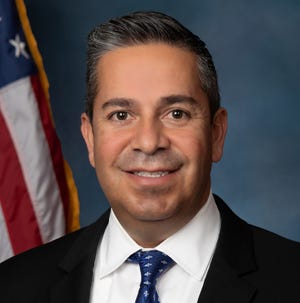A controversial executive action from the administration of President Joe Biden that restricted some oil and gas activity on federal land was set to expire on Sunday, as authority over oil and gas permits and other approvals was returned to the Bureau of Land Management (BLM) and its local field offices.
On Jan. 20, acting Interior secretary Scott de la Vega suspended the authority of sub-agencies within the Department like the BLM to make needed approvals for oil and gas operations such as permits to drill, tie into pipelines and rights of way need to transport oil and natural gas.
The order meant such decisions were to be made at the cabinet level – effectively slowing the process and restricting the ability of field offices to work directly with local operators.
More:Deb Haaland to lead Interior amid concerns from New Mexico oil and gas industry
The order was set for 60 days, and an Interior spokesperson confirmed to the Current-Argus on Tuesday that it would not be renewed.
Biden himself also enacted an executive order to place a temporary but indefinite halt on new oil and gas leases on federal land.
But existing leases still need frequent approvals for operations, to connect to pipelines for transportation, begin drilling or adjust equipment for safety needs.
More:Biden’s review of oil and gas leasing moves forward amid concern from New Mexico leaders
Under de la Vega’s order, those decisions were removed from local field offices such as the BLM’s Carlsbad Field Office, which was found to be one of the busiest in the nation with thousands of such approvals annually.
And while new leases were still blocked, management of active leases was returned to the local office as of March 21 – the day after the two-month term of the initial order.
The order’s sunset was applauded by New Mexico’s Democrat U.S. Sens. Martin Heinrich and Ben Ray Lujan who previously urged the Biden administration to not extend the order for fear it could be detrimental to the state’s economy.
More:New Mexico oil and gas emissions grew in 2020, study says, while spills declined
New Mexico ranks third in the nation for oil production and ninth in natural gas, while oil and gas provides about a third of the state’s budget each year with more than half of such operations occurring on federal land.
Industry and political leaders argued since Biden took office that his federal actions related to fossil fuel extraction could impact New Mexico more than any other state.
In a joint statement, Heinrich and Lujan commended the Interior Department for ending the suspension of the BLM’s authority, contending New Mexico’s leaders were committed to working with the Biden administration to address pollution and climate change while continuing to produce fossil fuels.
More:New Mexico bill to diversify economy beyond oil and gas gains steam in State House

“While a temporary review period at the beginning of the new administration is reasonable, extending the review period could have led to unnecessary delays that would have a negative impact on New Mexico’s economy,” the senators wrote.
“We will continue to work with our colleagues in Congress and the entire Biden administration to ensure that energy states like ours are able to make a smooth transition to a diversified economy based on clean energy and a carbon-free future.”
Rural communities such as Carlsbad, situated in the Permian Basin oilfield in southeast New Mexico and West Texas, could be especially harmed by such federal actions, the senators wrote, as operators could leave the state and layoff local workers while cutting revenue to regions that host oil and gas developments.
More:Lujan Grisham joins state leaders voicing concerns for Biden’s halt on oil and gas leases
“Oil and gas workers and the communities they live in have helped build our nation for more than a century, and revenues from mineral production have supported New Mexico’s educational system and state budget,” wrote the senators.
“It is morally imperative that we don’t leave these workers and their communities behind as we tackle the climate crisis with the urgency it requires.”
New Mexico leaders wary of continued oil and gas leasing halt
Heinrich and Lujan also called on the President and his administration to end the halt on new federal oil and gas leases.

More:Investors call on oil and gas companies to address climate concerns in Permian Basin
The Interior Department reported oil and gas companies hold 13.9 million leased but unused onshore acres of federal land – 53 percent of the 26 million total acres set aside for oil and gas production.
On and offshore the Department reported oil and gas companies hold 7,700 approved but inactive drilling permits.
New Mexico’s State energy regulators asserted the impact of the halt on new leases would likely not be felt for about two years, but in the long-term such a ban could bring significant funding shortages to the state as companies would be unable to lease new land.
More:Ozone problems continue to plague New Mexico. Enviros seek federal action, blame oil and gas
The Department announced it was moving forward with a review of its federal leasing program, scheduling a townhall meeting on March 25 to solicit feedback from stakeholders during the leasing pause.
“Though a short-term pause is fully appropriate in the new Biden administration, an extended and indefinite suspension would have significant impacts on our workforce and state funding for education and creates unnecessary uncertainty for New Mexico’s state and local tax revenues,” Heinrich and Lujan said.
“We oppose an indefinite federal ban on oil and gas leasing, and we urge the administration to complete its review and resume responsible leasing as soon as possible.”
More:Energy secretary called on to consider impact on New Mexico, oil and gas of federal policy
New Mexico Gov. Michelle Lujan Grisham also warned the Biden administration of the dire impact the leasing halt could have in disrupting one of New Mexico’s major economic drivers.
She penned a letter to the President on Monday, urging him to consider such effects of the halt and touting several initiatives at the state level aimed at reducing the environmental impact of oil and gas.
Since taking office, Lujan Grisham took action to realign the state with the Paris Climate Accord after former-President Donald Trump pulled the U.S. out of the international agreement aimed at reducing carbon emissions.
More:Extreme winter weather in Permian Basin could cause spike in oil and gas emissions
She also signed into law the Energy Transition Act which set benchmarks for the state to reduce its carbon footprint, while Lujan Grisham’s administration embarked on tougher regulations for water use and methane emissions by oil and gas operators.

If New Mexico saw just a 10 percent decline in oil and gas production, Lujan Grisham said the state could lose up to $709 million between 2021 and 2025.
Lujan Grisham requested the Biden administration grant New Mexico “energy transition credit” while fossil fuel decisions are made, signaling the state could be exempted from restrictions on oil and gas.
More:Permian Basin sees more oil investments, New Mexico rig count remains stagnant
The governor argued restrictive federal policies could mean operators leave New Mexico for places with less-stringent environmental protections which could ultimately bring more pollution.
“Despite our investments in economic diversification and renewable energy in particular, oil and gas production remains a significant economic force in New Mexico,” Lujan Grisham wrote.
“We ask that our state-level efforts to combat climate change and ensure more responsible oil and gas development be considered and that New Mexico be granted energy transition credit as you chart a path forward on climate change and oil and gas leasing in particular.”
Adrian Hedden can be reached at 575-618-7631, achedden@currentargus.com or @AdrianHedden on Twitter.






